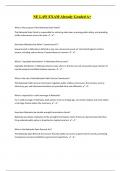NE LAW EXAM Already Graded A+
What is the purpose of the Nebraska State Patrol?
The Nebraska State Patrol is responsible for enforcing state laws, ensuring public safety, and providing
traffic enforcement across the state. ✔️✔️
How does Nebraska law define "sexual assault"?
Sexual assault in Nebraska is defined as any non-consensual sexual act committed against another
person, including various forms of sexual abuse or coercion. ✔️✔️
What is "equitable distribution" in Nebraska divorce cases?
Equitable distribution in Nebraska divorce cases refers to the fair, but not necessarily equal, division of
marital property and debts between spouses. ✔️✔️
What is the role of the Nebraska Public Service Commission?
The Nebraska Public Service Commission regulates public utilities and ensures that services such as
electricity, gas, and telecommunications are provided fairly and efficiently. ✔️✔️
What is required for a valid marriage in Nebraska?
For a valid marriage in Nebraska, both parties must be of legal age, not closely related, and must obtain
a marriage license before the ceremony. ✔️✔️
How does Nebraska law handle wrongful termination claims?
Nebraska law allows employees to file wrongful termination claims if they can demonstrate that their
firing violated public policy or breached an implied contract. ✔️✔️
What is the Nebraska Open Records Act?
The Nebraska Open Records Act ensures that the public has access to government records, promoting
transparency and accountability in government operations. ✔️✔️
,What does "legal separation" mean in Nebraska?
Legal separation in Nebraska is a court-approved arrangement where spouses live apart while remaining
legally married, often involving issues of support and property division. ✔️✔️
What is the penalty for driving with a suspended license in Nebraska?
The penalty for driving with a suspended license in Nebraska can include fines, extended suspension
periods, and potential jail time, depending on the circumstances. ✔️✔️
What is the Nebraska Crime Victim's Bill of Rights?
The Nebraska Crime Victim's Bill of Rights provides victims of crime with specific rights, including the
right to be informed of proceedings and the right to restitution. ✔️✔️
How does Nebraska law define "contributory negligence"?
Contributory negligence in Nebraska refers to a legal doctrine where a plaintiff may be barred from
recovering damages if they are found to be partially at fault for their own injuries. ✔️✔️
What is the Nebraska Department of Health and Human Services responsible for?
The Nebraska Department of Health and Human Services is responsible for providing health care
services, child welfare, and social services to residents of the state. ✔️✔️
What is required for a business to operate legally in Nebraska?
For a business to operate legally in Nebraska, it must register with the Secretary of State, obtain
necessary licenses and permits, and comply with state regulations. ✔️✔️
How does Nebraska law treat bankruptcy filings?
Nebraska law allows individuals and businesses to file for bankruptcy under federal law, providing a legal
process to address insolvency and discharge debts. ✔️✔️
What are the legal rights of tenants under Nebraska landlord-tenant law?
Tenants in Nebraska have legal rights, including the right to a habitable living environment, protection
against discrimination, and the right to fair notice before eviction. ✔️✔️
,What is the procedure for filing a small claims case in Nebraska?
To file a small claims case in Nebraska, an individual must complete the necessary forms, pay the filing
fee, and serve the defendant with notice of the claim. ✔️✔️
What does Nebraska law say about animal cruelty?
Nebraska law prohibits animal cruelty, defining it as intentionally causing harm or suffering to animals,
and establishes penalties for violators. ✔️✔️
How are disputes regarding wills contested in Nebraska?
Disputes regarding wills in Nebraska can be contested in probate court, where interested parties can
challenge the validity of the will based on various grounds. ✔️✔️
What is "reasonable suspicion" in Nebraska criminal law?
Reasonable suspicion in Nebraska criminal law refers to a legal standard that allows law enforcement to
stop and briefly detain a person based on specific, articulable facts suggesting criminal activity. ✔️✔️
What are the consequences of shoplifting in Nebraska?
Consequences of shoplifting in Nebraska can range from fines and restitution to misdemeanor or felony
charges, depending on the value of the stolen property. ✔️✔️
38-2902. Purpose of act. ✔️✔️The purpose of the Physical Therapy Practice Act is to update and
recodify statutes relating to the practice of physical therapy.
38-2904. Approved educational program, defined. ✔️✔️Approved educational program means a
program for the education and training of physical therapists and physical therapist assistants approved
by the board pursuant to section 38-2926.
38-2906. Direct supervision, defined. ✔️✔️Direct supervision means supervision in which the
supervising practitioner is physically present and immediately available and does not include supervision
provided by means of telecommunication.
, 38-2908. General supervision, defined. ✔️✔️General supervision means supervision either onsite or
by means of telecommunication.
38-2912. Physical therapist, defined. ✔️✔️Physical therapist means a person licensed to practice
physical therapy under the Physical Therapy Practice Act.
38-2913. Physical therapist assistant, defined. ✔️✔️Physical therapist assistant means a person
certified as a physical therapist assistant under the Physical Therapy
38-2914. Physical therapy or physiotherapy, defined. ✔️✔️Physical therapy or physiotherapy means:
(1) Examining, evaluating, and testing individuals with mechanical, physiological, and developmental
impairments, functional limitations, and disabilities or other conditions related to health and movement
and, through analysis of the evaluative process, developing a plan of therapeutic intervention and
prognosis while assessing the ongoing effects of the intervention;
(2) Alleviating impairment, functional limitation, or disabilities by designing, implementing, or modifying
therapeutic interventions which may include any of the following: Therapeutic exercise; functional
training in home, community, or work integration or reintegration related to physical movement and
mobility; therapeutic massage; mobilization or manual therapy; recommendation, application, and
fabrication of assistive, adaptive, protective, and supportive devices and equipment; airway clearance
techniques; integumentary protection techniques; nonsurgical debridement and wound care; physical
agents or modalities; mechanical and electrotherapeutic modalities; and patient-related instruction; but
which does not include the making of a medical diagnosis;
(3) Purchasing, storing, and administering topical and aerosol medication in compliance with applicable
rules and regulations of the Board of Pharmacy regarding the storage of such medication
(4) Reducing the risk of injury, impairment, functional limitation, or disability, including the promotion
and maintenance of fitness, health, and wellness; and
(5) Engaging in administration, consultation, education, and research.
38-2915. Physical therapy aide, defined. ✔️✔️Physical therapy aide means a person who is trained
under the direction of a physical therapist and who performs treatment-related and non-treatment-
related tasks.
38-2919. License or certificate required. ✔️✔️(1) No person may practice physical therapy, hold
oneself out as a physical therapist or physiotherapist, or use the abbreviation PT in this state without
being licensed by the department. No person may practice as a physical therapist assistant, hold oneself





